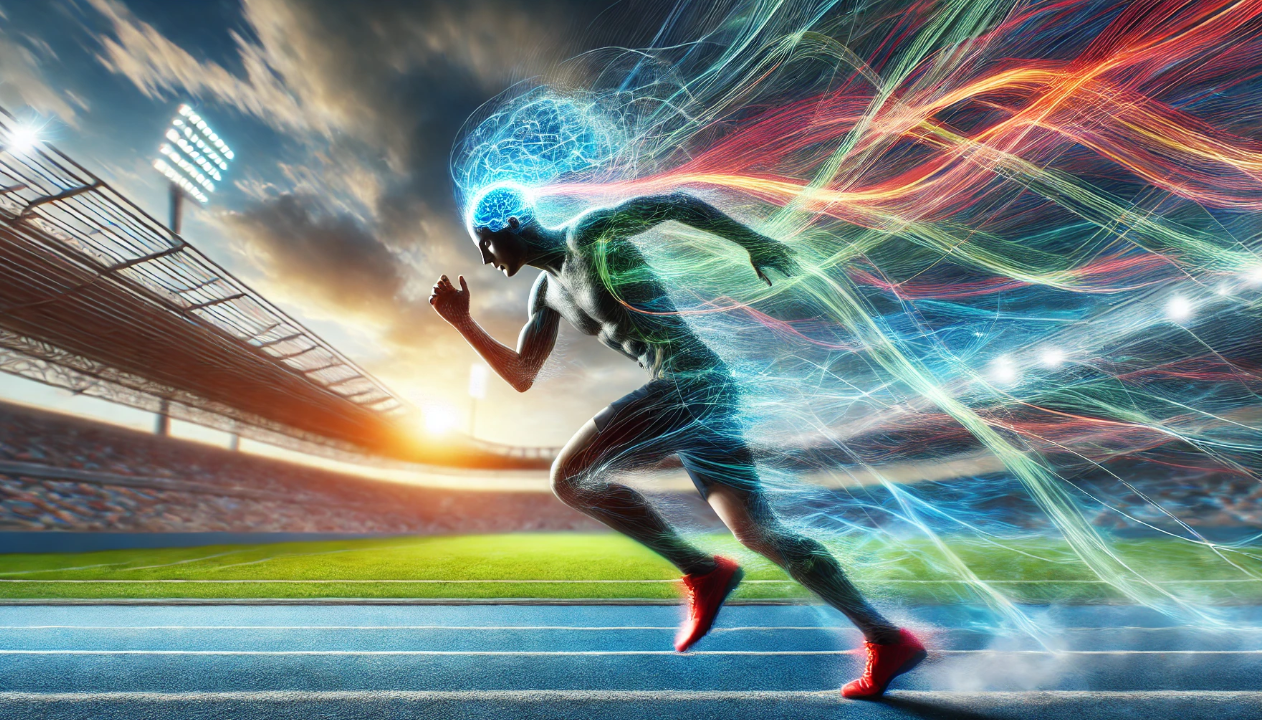Imagine a basketball player at the free-throw line, the crowd roaring, the game on the line. Despite the pressure, she takes a deep breath, visualizes the perfect shot, and sinks the ball with practiced ease. This scenario exemplifies the power of the mind-body connection in sports – a crucial yet often overlooked aspect of athletic performance.
In this comprehensive guide, we’ll explore the intricate relationship between mental and physical aspects of sports performance. Whether you’re an athlete striving for excellence, a coach seeking to unlock your team’s potential, or a sports enthusiast curious about the inner workings of peak performance, understanding the mind-body connection can be a game-changer.
Understanding the Mind-Body Connection in Sports
The mind-body connection refers to the intricate interplay between our thoughts, emotions, and physical states. In sports, it encompasses how an athlete’s mental state influences their physical performance and vice versa.
Historical Perspectives
The concept of a connection between mind and body in athletics is not new. Ancient Greek philosophers emphasized the importance of both mental and physical training for athletes. The Roman phrase “mens sana in corpore sano” (a sound mind in a sound body) encapsulates this enduring idea.
Importance in Modern Sports
In today’s highly competitive sports world, the mind-body connection influences everything from reaction times and coordination to endurance and recovery. Athletes who neglect their mental game are at a significant disadvantage.
Benefits of a Strong Mind-Body Connection
- Improved focus and concentration during competition
- Enhanced physical performance through mental techniques
- Quicker recovery from injuries
- Better stress and anxiety management
- More consistent performance over time
The Science Behind the Athletic Mind-Body Link
Neurobiology of the Mind-Body Connection
The mind-body connection in sports is rooted in the complex interactions within our nervous system. The brain doesn’t just send signals to the body; it receives constant feedback, creating a two-way communication channel.
Key neurobiological aspects include:
- Neural plasticity: The brain’s ability to form new connections, allowing for skill acquisition and refinement.
- Motor cortex activation: Mental rehearsal of movements activates similar brain regions as physical practice.
- Neurotransmitter balance: Mental states influence the release of hormones and neurotransmitters that affect physical performance.
Psychoneuroimmunology in Sports
Psychoneuroimmunology (PNI) studies how psychological processes interact with the nervous and immune systems. In sports, PNI helps explain:
- The impact of stress on athletic performance and recovery
- How positive mental states can enhance physical healing
- The role of mental training in boosting immune function during intense training periods
The Role of the Nervous System
The nervous system plays a crucial role in coordinating the mind-body connection in sports:
- Central Nervous System (CNS): Comprises the brain and spinal cord. It processes information, makes decisions, and coordinates complex movements.
- Peripheral Nervous System (PNS): Includes all nerves outside the CNS.
- Somatic Nervous System: Controls voluntary movements
- Autonomic Nervous System: Regulates involuntary functions like heart rate and digestion
Key Aspects of Mind-Body Integration in Sports
Mental Toughness and Resilience
Mental toughness is the psychological edge that enables athletes to cope better with the many demands of sports. It encompasses:
- Ability to perform under pressure
- Bouncing back from setbacks
- Maintaining focus despite distractions
Developing mental toughness involves:
- Setting challenging but achievable goals
- Practicing positive self-talk
- Engaging in mental rehearsal of challenging scenarios
Focus and Concentration
The ability to maintain focus and concentration is crucial in sports. It involves:
- Selective attention: Focusing on relevant cues while ignoring distractions
- Sustained attention: Maintaining focus over extended periods
- Divided attention: Managing multiple tasks or information sources simultaneously
Techniques to improve focus include:
- Mindfulness training
- Concentration grid exercises
- Simulation training to practice focus in game-like conditions
Emotional Regulation in Athletics
Emotional regulation refers to the ability to manage and respond to emotional experiences. In sports, this skill is vital for:
- Maintaining composure under pressure
- Channeling pre-competition nerves into positive energy
- Recovering quickly from mistakes or setbacks during competition
Strategies for emotional regulation include:
- Cognitive reframing: Interpreting events in a more positive or neutral light
- Breathing techniques: Using controlled breathing to manage physiological arousal
- Pre-performance routines: Developing consistent routines to manage emotions
Body Awareness and Proprioception
Body awareness, or kinesthetic sense, is the ability to accurately perceive the position and movement of one’s body parts. For athletes, enhanced body awareness can lead to:
- Improved technique and form
- Better balance and coordination
- Reduced risk of injury
Techniques to enhance body awareness include:
- Yoga and Pilates practices
- Specialized balance training
- Mindful movement exercises
Techniques to Enhance Mind-Body Connection for Athletes
Mindfulness and Meditation
Mindfulness, the practice of present-moment awareness without judgment, has gained significant traction in the sports world. Benefits for athletes include:
- Improved focus and concentration
- Enhanced emotional regulation
- Better stress management
Meditation techniques for athletes:
- Breath awareness meditation
- Body scan meditation
- Loving-kindness meditation for team cohesion
Visualization and Imagery Techniques
Visualization involves creating or recreating an experience in the mind. In sports, it can be used to:
- Rehearse skills and strategies
- Prepare for various competitive scenarios
- Enhance confidence and reduce anxiety
Key visualization techniques:
- Internal imagery (first-person perspective)
- External imagery (third-person perspective)
- Multi-sensory imagery (incorporating all senses)
Breathing Exercises for Sports Performance
Proper breathing techniques can significantly impact both physical and mental aspects of sports performance. Benefits include:
- Improved oxygenation and endurance
- Reduced anxiety and tension
- Enhanced focus and concentration
Effective breathing exercises for athletes:
- Diaphragmatic breathing: Deep belly breathing to promote relaxation and focus
- Box breathing (4-4-4-4 pattern): Inhale for 4 counts, hold for 4, exhale for 4, hold for 4
- Alternate nostril breathing: A yogic technique to balance the nervous system
Yoga and Mind-Body Integration in Athletics
Yoga offers a holistic approach to mind-body integration, providing benefits such as:
- Improved flexibility and balance
- Enhanced body awareness
- Stress reduction and mental clarity
Yoga practices beneficial for athletes:
- Power yoga for strength and endurance
- Yin yoga for recovery and flexibility
- Yoga nidra for deep relaxation and mental rehearsal
Nutrition and the Mind-Body Connection in Sports
How Diet Affects Mental Performance in Athletes
Nutrition plays a crucial role in both physical and mental aspects of athletic performance. Key points include:
- Impact of macronutrients on cognitive function
- Role of micronutrients in brain health
- Importance of meal timing for optimal mental performance
Nutrients for Optimal Brain Function in Sports
Certain nutrients are particularly important for cognitive function and mental performance in athletes:
- Omega-3 fatty acids: Support brain health and reduce inflammation. Found in fatty fish, flaxseeds, and walnuts.
- Antioxidants: Protect against oxidative stress in the brain. Abundant in colorful fruits and vegetables.
- B-vitamins: Essential for energy production and neurotransmitter synthesis. Found in whole grains, lean meats, and leafy greens.
- Magnesium: Supports nerve function and helps reduce stress. Present in nuts, seeds, and whole grains.
- L-theanine: An amino acid that promotes relaxation without drowsiness. Found in green tea.
Hydration and Cognitive Performance in Athletics
Proper hydration is crucial for both physical and mental performance in sports:
- Effects of dehydration on cognitive function: Even mild dehydration can impair attention, memory, and decision-making.
- Optimal hydration strategies: Develop a personalized hydration plan based on body weight, sweat rate, and environmental conditions.
- Electrolyte balance: Maintain proper electrolyte levels for optimal neural function and mental clarity.
Athletes should aim to stay well-hydrated throughout the day, not just during training or competition. A good rule of thumb is to drink enough water so that urine remains pale yellow.
Overcoming Mental Barriers in Athletic Performance
Dealing with Performance Anxiety
Performance anxiety can significantly impact an athlete’s ability to perform at their best. Strategies to manage it include:
- Cognitive-behavioral techniques: Identify and challenge negative thought patterns
- Progressive muscle relaxation: Systematically tense and relax muscle groups to reduce physical tension
- Reframing anxiety as excitement: Interpret pre-performance arousal as a positive rather than negative state
It’s important to remember that some level of anxiety is normal and can even be beneficial for performance when managed properly.
Overcoming Fear of Failure in Sports
Fear of failure can be paralyzing for athletes. Techniques to address this include:
- Goal-setting focused on process rather than outcome: Emphasize personal improvement over winning
- Developing a growth mindset: View challenges as opportunities for learning and improvement
- Using failure as a learning opportunity: Analyze setbacks to identify areas for improvement
Coaches and athletes can work together to create an environment that values effort and learning over perfect performance.
Building Confidence Through Mind-Body Awareness
Confidence is a key factor in athletic success. Enhancing mind-body awareness can boost confidence by:
- Improving body language and posture: Practice power poses to boost confidence
- Enhancing awareness of physical capabilities: Regularly acknowledge personal strengths and improvements
- Developing trust in one’s skills and preparation: Use positive self-talk and affirmations
Regular practice of mindfulness and body awareness techniques can help athletes develop a stronger sense of self-confidence and trust in their abilities.
Conclusion
The mind-body connection in sports is a powerful tool that can significantly enhance athletic performance. By understanding the science behind this connection and implementing techniques to strengthen it, athletes can unlock new levels of achievement.
Key takeaways from this guide include:
- The intimate link between mental states and physical performance in sports
- The importance of developing mental toughness, focus, and emotional regulation
- Practical techniques like mindfulness, visualization, and breathing exercises to enhance the mind-body connection
- The role of nutrition and hydration in supporting cognitive function and mental performance
- Strategies for overcoming common mental barriers in sports
Remember, developing a strong mind-body connection is not an overnight process. It requires consistent practice and patience. Start by incorporating some of the techniques discussed in this article into your training regimen. Pay attention to how your mental state affects your physical performance and vice versa.
Whether you’re aiming for a personal best or competing at the highest levels, nurturing the connection between your mind and body can be the key to reaching your full potential as an athlete. Embrace this holistic approach to sports performance, and watch as both your mental and physical game reach new heights.
Frequently Asked Questions
How does the mind-body connection affect sports performance?
The mind-body connection influences sports performance in numerous ways, including improved focus, better stress management, enhanced physical coordination, and increased resilience. A strong mind-body connection allows athletes to maintain composure under pressure, visualize success, and recover more quickly from setbacks.
Can improving my mind-body connection help prevent sports injuries?
Yes, enhancing your mind-body connection can contribute to injury prevention. Improved body awareness helps athletes maintain proper form and technique, reducing the risk of overuse injuries. Additionally, mental techniques like visualization can help athletes prepare for potentially risky situations, improving their ability to react safely.
What are the best exercises to enhance mind-body awareness for athletes?
Effective exercises for enhancing mind-body awareness include mindfulness meditation, yoga, tai chi, and body scan techniques. Sport-specific drills that incorporate mental elements, such as visualization during physical practice, can also be highly effective.
How long does it take to see results from mind-body training in sports?
The time frame for seeing results can vary depending on the individual and the consistency of practice. Some athletes report feeling benefits like improved focus and reduced anxiety within a few weeks of regular practice. However, for more significant improvements in performance, a commitment of several months is typically necessary.
Is the mind-body connection equally important for all types of sports?
While the mind-body connection is crucial for all sports, its specific applications may vary. In precision sports like golf or archery, mental clarity and focus are paramount. In team sports, emotional regulation and quick decision-making might be more emphasized. Endurance sports often require strong mental resilience. Regardless of the sport, cultivating a strong mind-body connection can enhance overall performance.



